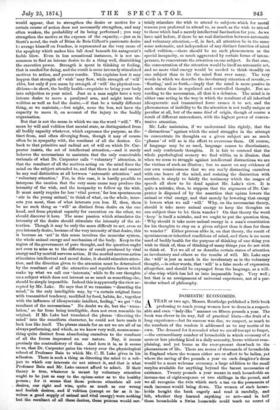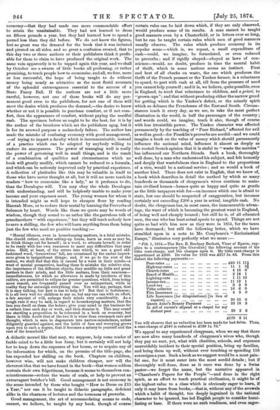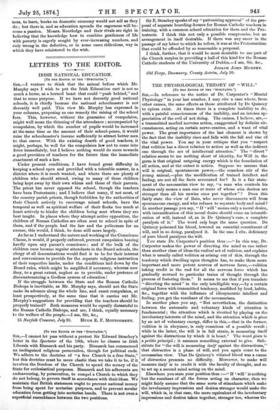DOMESTIC ECONOMIES.
AYEAR or two ago, Messrs. Routledge published a little book professing to teach young women how to dress in a respect- able and even " lady-like " manner on fifteen pounds a year. The book was clever in its way, full of practical hints—the fruit of a long experience—but its success was due, we suspect, as much to the numbers of the readers it addressed as to any merits of its own. The demand for it revealed what we are all too apt to forget, —the extraordinary number of households in which economy of a more or less pinching kind is a daily necessity, borne without com- plaining, and yet borne as the ever-present drawback to the pleasantness of life. There are scores of thousands of households in England where the women either are or affect to be ladies, yet where the saving of five pounds a year on each daughter's dress would be a most welcome economy, a large addition to the small surplus available for anything beyond the barest necessaries of existence. Twenty pounds a year means in such households an income-tax of eighteenpence or two shillings in the pound, and we all recognise the ruin which such a tar on the possessors of such incomes would bring down. The women of such house- holds bought the book eagerly and read it carefully, and felt, whether they learned anything or not—and in half these households a Swiss housewife could teach no secret of
economy—that they had made one more commendable effort to attain the unattainable. They had not learned to dress on fifteen pounds a year, but they had learned how to spend a pound less than they did before. We do not know the figures, but so great was the demand for the book that it was imitated and pirated on all sides, and so great a confusion created, that to this day two or three authors or their publishers think it profit- able for them to claim to have produced the original work. The same vein apparently is to be tapped again this year, and we shall
by October see a swarm of little books all professing, or rather promising, to teach people how to economise, and all, we fear, more or less successful, the hope of being taught to do without money being nearly as attractive as the most florid accounts of the splendid extravagances essential to the success of a State Fancy Ball. If the authors are not a little more careful, however, not one of these books will do any per- manent good even to the publishers, for not one of them will meet the desire which produces the demand,—the desire to know whether or not it is possible to purchase comfort, or if not com- fort, then the appearance of comfort, without paying the needful cash. The specimen before us ought to be the best, for it is by the author of the brochure which set the publishers agog, but it is for its avowed purpose a melancholy failure. The author has made the mistake of confusing economy with good management, —of trying to impart a faculty which is incommunicable, instead of a practice which can be adopted by anybody willing to endure its annoyances. The power of managing well is really the power of governing well in small things, and is the result of a combination of qualities and circumstances which no book will greatly modify, which cannot be reduced to a formula, and which can be seriously improved only by practical experience. A collection of platitudes like this may be valuable in itself to those who have never thought at all, but it will no more teach its readers " how to economise like a lady," as it professes to do, than the Decalogue will. You may obey the whole Decalogue with understanding, and still be helplessly unable to make your income and your expenses meet. The young women for whom it is intended might as well hope to cheapen flour by reading Hannah More, or to reduce their rental by learning the Proverbs of Solomon by heart. Words like these we quote may be words of wisdom, though they sound to us rather like the garrulous talk of grandmothers " with experience," but they will teach nobody how to save a shilling, the few who will learn anything from them being just the few who need no positive teaching :— "Mental idleness, even in housekeeping matters, is a fatal mistake. She should rather, on first setting-up house, learn as soon as may be, to think things out for herself ; in a word, to educate herself, in order to be ready with her own resources to meet any difficulties that may arise. Half, at least, of the errors into which, to use a good old- fashioned word, 'housewives' fall, are occasioned by the undue import- ance given to insignificant things; and, if we go to the root of the matter, we shall find that this is caused by a want in their minds—a want of mental perspective, leading them to mistake the relative size, the importance of the different objects, they muddle up little and great matters in their minds, and the little matters, from their nearness— immediateness, for which no allowance is made by intellects of this calibre, are permitted to eclipse far greater questions, which, from being more remote, are frequently passed over as unimportant, while in reality they far outweigh everything else. You will say, perhaps, that it is easy talking, but how is one to help it ? But that is foolishness ; it is all very well for children to say so, but any one can with an effort, a fair amount of will, enlarge their minds very considerably. As a rough rule it may be said, in regard to housekeeping matters, that the less you dwell on them the better ; give your mind to the business for a certain time each day or week, and then dismiss it. This may sound too startling a proposition to be tolerated in a book on economy, but there is little doubt that of the two it is wiser than overmuch care and thought, which is sure to degenerate into narrow-mindedness, unless diligently guarded against, and the habit of fuss and worrying grows upon you to such a degree, that it becomes a misery to yourself and the rest of the household."
A didactic morsel like that may, we suppose, help some reader of feeble mind to be a little less fussy, but it certainly will not help her to keep down the expenses of her house, or to acquire any of the information for which, on the promise of the title-page, she has expended her shilling on the book. Chapters on children, however wise, will not make children cheaper, nor will the cleverest idea that we have found in the book—that women seldom restrain their own fidgettiness, because it seems to themselves con- scientiousness—reduce the waste of coals, or help to prevent an extravagant butcher's bill. Good management is not economy in the sense intended by those who bought " How to Dress on £15 a Year," nor can it be taught in didactic paragraphs, deficient alike in the clearness of lectures and the terseness of proverbs.
Good management, the art of accommodating means to ends, cannot, we believe, be taught by any book, though of course
certain rules can be laid down which, if they are only observed, would produce some of its results. A man cannot be taught good manners even by a Chesterfield, or in letters ever so long, but he can be taught certain rules which men of good manners usually observe. The rules which produce economy in its popular sense—which is, we repeat, a small expenditure of cash—could, we imagine, be formulated, or even reduced to proverbs ; and if rigidly obeyed—obeyed as laws of con- science—would, no doubt, produce in time the mental habit of thrift, which in some nations seems an instinct. First and best of all checks on waste, the one which produces the thrift of the French peasant or the Yankee farmer, is a reluctance to spend, to part with cash at all, till from the pressure of need you cannot help yourself ; and it is, we believe, quite possible, even in England, to teach that reluctance to children, and a priori, to "grown-ups"; and that without producing either the narrow greed for getting which is the Yankee's defect, or the miserly spirit which so debases the Frenchman of the East and South. Circum- stances teach it every day, as we see, to take the most perfect illustration in the world, in half the parsonages of the country ; and words could, we imagine, teach it also, though of course with less irresistible power. The Yankee character was affected permanently by the teaching of "Poor Richard," affected for evil as well as good—for Franklin's proverbs are sordid—and we could imagine a book on the value of money which should permanently influence the national mind, influence it almost as deeply as the rooted Scotch opinion that it is sinful to " waste the mercies " has influenced our Northern. friends. Such a book, thoroughly well done, by a man who understood his subject, and felt honestly and deeply that wastefulness rises in England to the proportions of a vice, would be a national service ; and so would a book of another kind. There does not exist in English, that we know of, a book which describes in detail the method by which so many hundreds or thousands of clergymen's wives continue to main- tain civilised homes—homes quite as happy and quite as gentle as the little taxpayers wish for—on incomes which one is afraid to state, lest one should be suspected of exaggeration, but incomes certainly not exceeding £200 a year in actual, tangible cash. No doubt, the clergyman has, in most cases, the immeasurable advan- tage, the want of which is becoming the greatest want in England, of being well and cheaply housed ; but still he is, of all educated men, the one who has least actual specie to spend. Things are not quite so bad with him now as they were in 1854, for the taxes have decreased ; but still the following letter, which we have stumbled upon in a note to Mr. Conybeare's "Ecclesiastical Essays," illustrates very perfectly what we mean :— " Feb. 1, 1854.—The Rev. B. Bradney Bockett, Vicar of Epsotn, sup- plies to a contemporary [the Guardian] the following account of his tithe rent-charge, and the charges upon it. My tithe rent-charge is apportioned at £346. Its value for 1853 was £317 5s. 6d. From this
deduct the following payments :—
Poor-rates • • • • • •
.- £40 11 11f
Highway-rates ... • • • -.
11
1 5 Church-rates • • • ...
4 18
0
• • •
Board of Health... -.
2 14 1
• • •
Lighting-rate ...
1 11 10
Income-tax... ... • • • -.
11
12
1
Land-tax • • • Tithe collector ... • • •
Fire Insurance ... 4 9 0 Life Insurance (for dilapidation) [in lieu of repairs]... 20 15 0 Queen Anne's Bounty Payment 32 18 3 In aid of curate's stipend at a chapel for my distant poor ... ... 29 2 6
£179 3 11
You will observe that no reduction has been made for bad debts. Thus, a rent-charge of £346 is reduced to £138 Is. 7d."
We appeal to any experienced clergyman, when we say that there are now alive many hundreds of clergymen's wives who, though they pay no rent, yet, what with charities, schools, and expenses unavoidably incident to their special position, bring up families, and bring them up well, without ever touching or spending 150 sovereigns a year. Such a book as we suggest would be a most pain- ful one, for it must enter into the most sordid details ; but if thoroughly well done, done as it once was done by a Swiss pastor—we forget the name, but the narrative appeared in " Chambers's Papers for the People "—and done in the right spirit, as an effort to teach practical civilisation, it might be of the highest value to a class which is obviously eager to learn, if only it may learn from books,—that is, without any of the avowals which a habit of thought, too deeply ingrained in the national character to be ignored, has led English people to consider humi- liating or base. If there were no such readiness, and even eager- mess, to learn, books on domestic economy would not sell as they do ; but there is, and as education spreads the eagerness will be- come a passion. Messrs. Routledge and their rivals are right in believing that the knowledge how to combine gentleness of life with poverty is eagerly sought by ever-increasing numbers, and only wrong in the defective, or in some cases ridiculous, way in which they have ministered to the wish.




































 Previous page
Previous page